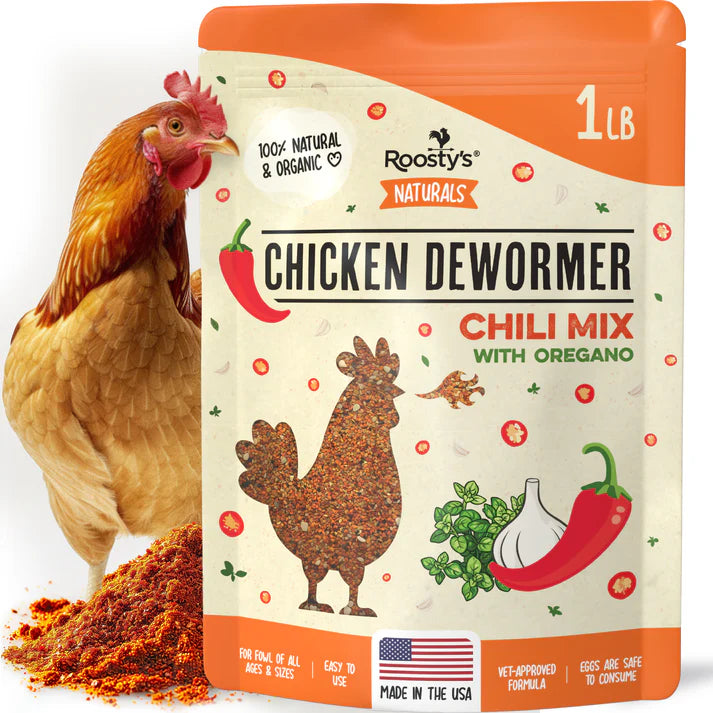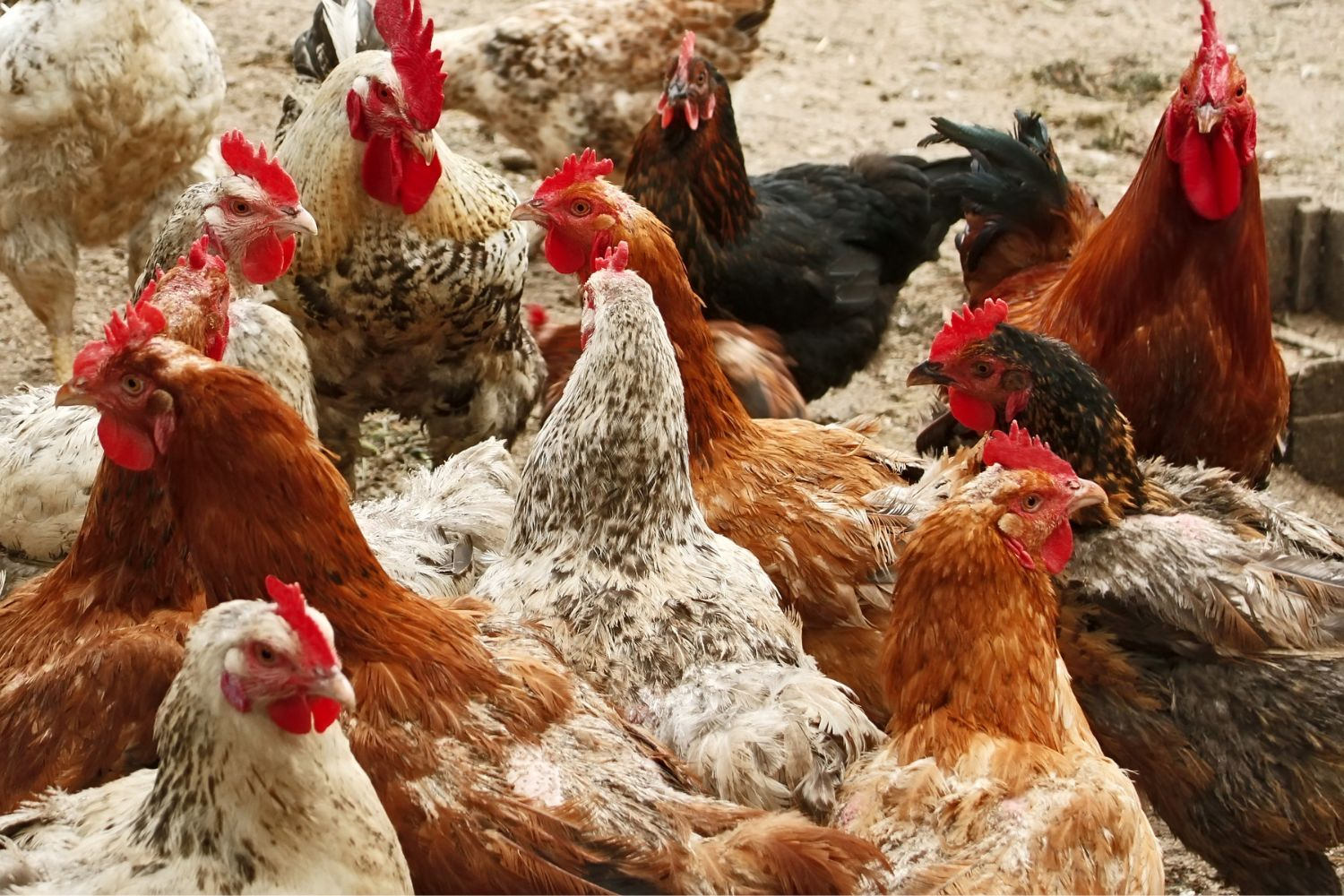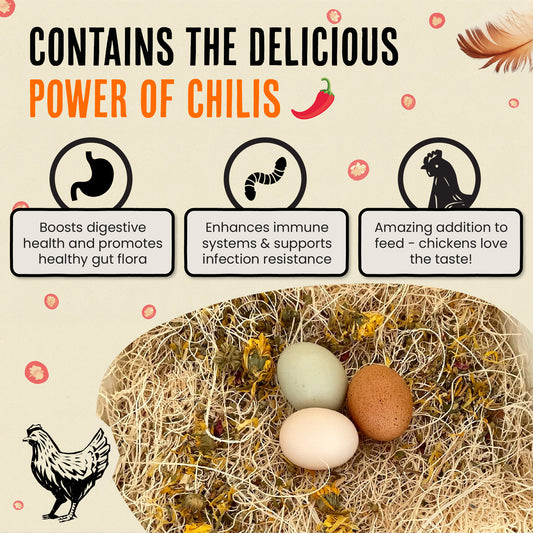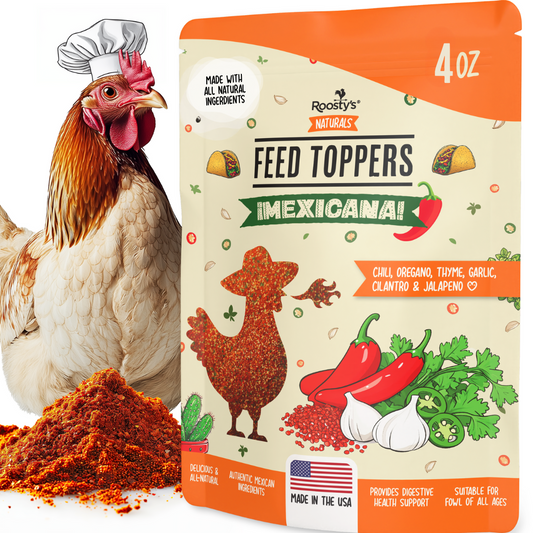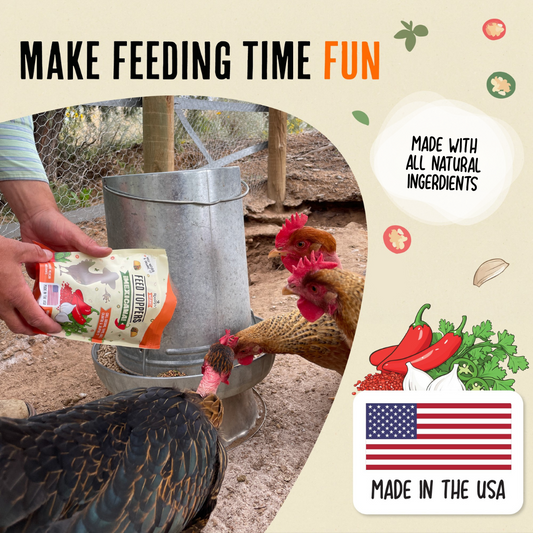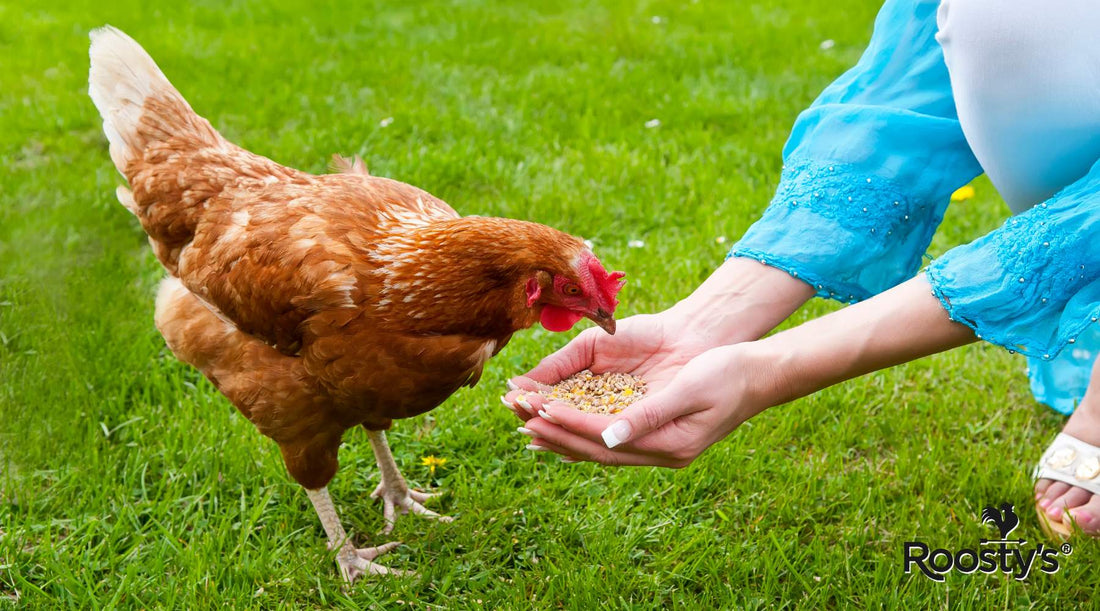
What Is in Chicken Feed: Understanding the Ingredients in Poultry Nutrition

Chicken feed contains a mix of carbohydrates, proteins, fats, and essential vitamins and minerals to support your little cluckers’ health.
Manufacturers carefully formulate it to provide everything they need, based on decades of research and experience.
But what’s in chicken feed? That’s what you’re about to discover. This article explores every component in intimate detail, all backed by our extensive research.
So what are you waiting for? Let’s dive in and discover what your birds are eating.
Understanding Chicken Feed Ingredients
Poultry requires a specific diet to support proper growth and development. Birds that don’t get the nutrition they need can fail to thrive.
As such, all commercial feed products contain a mixture of fats, proteins, carbohydrates, vitamins, and minerals.
Proteins are essential for chickens’ feathers, meat production, and tissue repair. Essential amino acids (protein building blocks) like cysteine, lysine, and methionine must be a part of their diet.
Carbohydrates should also be present as an energy source. This nutrient is essential for daily activities, from laying eggs to maintaining body temperature. Without it, egg-laying hens would quickly grind to a halt.
Fats also contain energy and help power chickens’ bodies, with more calories per gram than protein.
It provides birds with insulation (which can be helpful during the winter months) and also helps them absorb fat-soluble vitamins, too, which we discuss below.
Micronutrients are also essential for a range of processes in the body. Vitamin A is critical for vision, while vitamin D is for calcium absorption, just as it is for humans.
Other vitamins, like vitamin K, are essential for proper blood clotting and providing birds with antioxidants to mop up free radicals.
Fiber is another critical trace ingredient in chicken feed. While it isn’t a major part of their diet, birds still need a small amount to support digestive and microbial health.
The Composition of Chicken Feed

So, what is in chicken feed?
The high-level answer is everything chickens need for regular healthy growth and development. Commercial products provide comprehensive nutrition to help birds thrive.
Like other domesticated animals, chickens need a specific diet to grow, mature, and produce eggs. However, formulations must also be affordable.
The composition of commercial feeds reflects this. Manufacturers create the most cost-effective recipes to support chickens and keep them healthy throughout their development.
Grains
Grains provide the bulk of chicken feed because they are inexpensive and accessible.
Most formulations use corn, sorghum, and barley as feed, as these are easy to grow and complement local climates.
Sorghum is popular in Africa, whereas corn-based feeds are more common in the Americas. Some parts of the world bulk their formulations with rye, while others use wheat.
Generally speaking, the choice of grain doesn’t matter a great deal.
Grains tend to have a similar nutritional profile, with most containing moderate quantities of magnesium, phosphorus, iron, folate, thiamin, riboflavin, and niacin.
However, commercial growers often combine grains to complement each other to improve nutritional variety.
For example, they might mix barley for its selenium content with wheat for its zinc.
Generally, you should leave this process to the professionals. Combining individual nutrients at home may put your birds at risk of deficiency.
Protein Sources
Chicken feed also contains additional protein sources because birds need it for a healthy metabolism.
Manufacturers bump up the protein content in poultry diets by adding flax, field peas, sunflower seeds, soybeans, and other products to their feed mix.
Grains contain some protein, but it is not enough for chickens. Most only offer 10% per 100 calories while adult chickens require 14% to 18%.
If you don’t feed chickens enough protein, it can decrease egg production and impact their health. Chickens may appear lethargic or stop laying entirely.
Vitamins And Minerals
Chicken feed also contains vitamins and minerals essential for growing birds.
Commercial products come fortified with all the nutrients chickens require, including vitamins A, D, E, and B-complex, and minerals like calcium, phosphorus, and selenium.
These micronutrients are essential. For instance, chickens need vitamin A for vision and reproductive health and vitamin D for bone formation and calcium metabolism.
They also need vitamin C because they cannot make it from their diet, unlike some animals.
Chickens also need minerals such as potassium and sodium for electrolyte balance, and iron, copper, and iodine for chemical reactions in their bodies.
You shouldn’t need to modify the vitamin or mineral content of feed from commercial brands.
Experts formulate optimal concentrations based on decades of study and research.
However, if you decide to use chicken feed for another purpose (for instance, feeding ducks), you should adjust it to their nutritional needs.
Amino Acids
Commercial chicken feed formulations may also contain amino acids, or the building blocks of protein, required for healthy chicken development.
Some manufacturers add isolated lysine, methionine, threonine, and tryptophan to improve birds’ productivity.
For instance, methionine is a precursor of cysteine, one of the most essential amino acid building blocks for egg production.
Amino acids are also necessary for helping birds through the molting season by providing the building blocks they need for keratin, one of the main proteins in feathers.
Fats
Like humans, chickens also need some fats in their diet.
These provide energy and help maintain skin, feathers, and internal organs. They also let them absorb fat-soluble vitamins like A, D, E, and K.
Whole grains and protein sources naturally contain some fat, but only a tiny amount.
Therefore, commercial manufacturers supplement feed with animal fat or soybean oil to assist absorption.
Formulations may also contain flax or fish meal, high in omega-3 essential fatty acids. Just like humans, chickens require this nutrient, too.
Fiber Sources
Fiber is another ingredient in commercial chicken feed. Manufacturers sometimes add extra roughage to help maintain chickens’ gut health.
Insoluble fibers from cellulose or lignin should comprise 3 to 5% of chickens’ diets.
Research suggests this quantity of roughage helps boost nutrient metabolism, thanks to more muscular activity from the gizzard and enhanced stomach acid production.
Fiber is naturally present in whole grains. However, manufacturers may use refined grains to enhance shelf life and then add fibrous components back in afterward to improve digestion.
As such, many commercial formulations contain alfalfa or beet pulp to add fiber. More affordable products use soy hulls.
Additives
Commercial manufacturers may also mix additives into feeds to support chickens’ health. These include:-
- Prebiotics – nutrients that support the growth of friendly bacteria in chickens’ stomachs
- Probiotics – like bacterial cultures
- Enzymes – organic molecules that help chickens digest specific elements of their diet
Medications
They may also include medications to prevent health issues, especially if farmers keep birds in crowded conditions. The two most common are coccidiostats and antibiotics.
Coccidiostats control coccidiosis, an intestinal tract infection caused by a protozoa called coccidia.
The parasites multiply rapidly, damaging chickens’ intestinal lining and preventing them from absorbing nutrients from their food.
Putting medications directly in the food stops germs from growing and causing damage.
Likewise, antibiotics help keep chickens healthy and the food supply safe. Adding them reduces chickens’ bacterial load significantly, keeping dangerous pathogens out of the human food supply.
Note, though, that not all chicken feed contains medications.
If you keep backyard chickens, you do not need to feed your birds antibiotics or coccidiostats unless they have an infection. If you use medicated feeds, only do so under veterinary guidance.
Additional Ingredients
Lastly, some manufacturers include additional ingredients in their feed to enrich chickens’ health.
While these might not be essential, they can be an excellent addition to your birds’ diet, providing them with a higher quality of life.
Extras to look out for include:-
- Dried fruits
- Vegetables
- Natural flavorings
These enrichments may improve egg- quality and make birds healthier.
So, Now You Know What Chicken Feed Is Made Of
So, there you have it: everything you need to know about what goes into chicken feed pellets.
Manufacturers add a combination of all the nutrients you learned about in high school, balancing them to suit your birds’ nutritional requirements.
Just make sure you feed your chickens food that’s right for their stage in the life cycle. Chicks require more protein but less calcium in their diets than grown broilers.
Look for formulations from trusted brands that say they are “complete” or comprehensive. Avoid feeding chickens cracked grains and nothing else, as they won’t get the nutrition they need.
FAQs
Does chicken feed contain antibiotics?
Some chicken feeds contain antibiotics. Manufacturers include it to protect birds from infections that can sweet rapidly through flocks. However, you can get complete chicken feed without antibiotics.
What alternatives are there to chicken pellets?
You can add alternatives such as green veggies and fresh grass to your chicken feed. However, you shouldn’t replace it outright. If you do, your chickens could lack key nutrients.
Is it cheaper to make chicken feed at home?
Generally speaking, it is not cheaper to make chicken feed at home. Manufacturers leverage economies of scale that let them bring down prices significantly.
